关于humanity的一篇英文演讲稿
英语《人与社会》演讲稿范文
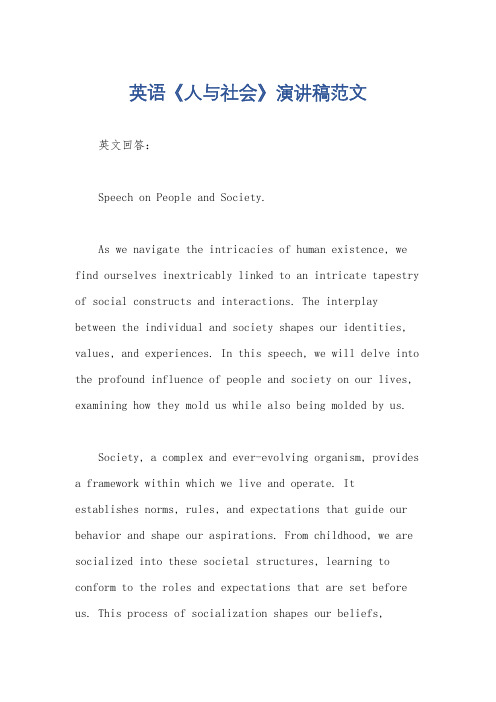
英语《人与社会》演讲稿范文英文回答:Speech on People and Society.As we navigate the intricacies of human existence, we find ourselves inextricably linked to an intricate tapestry of social constructs and interactions. The interplay between the individual and society shapes our identities, values, and experiences. In this speech, we will delve into the profound influence of people and society on our lives, examining how they mold us while also being molded by us.Society, a complex and ever-evolving organism, provides a framework within which we live and operate. It establishes norms, rules, and expectations that guide our behavior and shape our aspirations. From childhood, we are socialized into these societal structures, learning to conform to the roles and expectations that are set before us. This process of socialization shapes our beliefs,values, and worldviews, influencing the choices we make and the paths we pursue.Social institutions, such as family, education, and religion, play a significant role in this socialization process. They transmit cultural values and norms, providing individuals with a sense of belonging and purpose. However, society is not a monolithic entity; within it, there are myriad subcultures, each with its own unique set of values and beliefs. These subcultures can provide individuals with a sense of identity and belonging, but they can also leadto social stratification and conflict.While society exerts a profound influence on individuals, it is important to recognize that the relationship between the two is reciprocal. Individuals are not passive recipients of societal norms; they actively participate in shaping and reshaping their social environment. Through our actions, choices, and interactions, we contribute to the evolution of society. Social movements, for example, are often driven by individuals who seek to challenge existing social structures and create a more justand equitable society.The concept of agency is central to understanding the relationship between people and society. Agency refers to the capacity of individuals to make choices and act independently. It is through the exercise of agency that we can assert our individuality, challenge societal norms, and contribute to social change. However, our agency is not absolute; it is constrained by social structures and the power dynamics that exist within them.In conclusion, the relationship between people and society is a dynamic and complex one. Society shapes us, but we also shape society. Through socialization, social institutions, and subcultures, society influences our beliefs, values, and experiences. However, we are not mere puppets of society; through our agency, we can actively participate in shaping our social environment and creating a more just and equitable society.中文回答:人与社会主题演讲。
说人性的英语作文带翻译
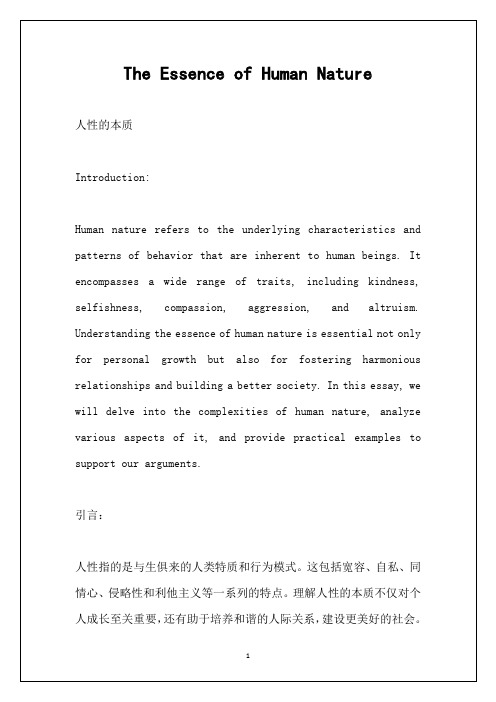
总之,人性是一个复杂而多方面的概念,包含了积极和消极的特点。它受到先天特质、环境因素和社会影响的综合影响。理解和认识人性的本质对个人成长以及培养和谐的人际关系和建设更美好的社会至关重要。通过认识人类的双重性,探究历史和文学的例子,认识到成长和改变的潜力,我们可以应对人性的复杂性,为实现一个更具同情心和开明的世界而努力。
尽管先天特质在塑造人性方面起着重要作用,环境和教养也有着深远的影响。从小灌输给个人的价值观和信念将极大地影响他们的行为和选择。例如,在充满爱和支持的环境中长大的儿童倾向于发展共感和善良的品德,而经历暴力或忽视的儿童可能表现出侵略或其他负面特征。此外,社会规范和文化影响也在决定人性表现方面发挥着至关重要的作用。
The Essence of Nature
人性的本质
Introduction:
Human nature refers to the underlying characteristics and patterns of behavior that are inherent to human beings. It encompasses a wide range of traits, including kindness, selfishness, compassion, aggression, and altruism. Understanding the essence of human nature is essential not only for personal growth but also for fostering harmonious relationships and building a better society. In this essay, we will delve into the complexities of human nature, analyze various aspects of it, and provide practical examples to support our arguments.
人性的考验演讲稿英文

人性的考验演讲稿英文Human Nature's Test Speech。
Ladies and gentlemen, 。
Today I want to talk to you about the test of human nature. It is said that true character is revealed in times of adversity, and I believe that this is a test that we all face at some point in our lives. Whether it is a personal crisis, a professional challenge, or a global pandemic, the test of human nature is a universal experience that can bring out the best or the worst in us.In times of crisis, we are often faced with difficult decisions and moral dilemmas that put our values and principles to the test. It is in these moments that our true character is revealed. Will we act with courage and compassion, or will we succumb to fear and selfishness? Will we rise to the occasion and show resilience, or will we crumble under pressure and despair?The test of human nature is not just about how we respond to adversity, but also how we treat others in times of need. It is a test of our empathy, kindness, and humanity. Will we reach out to help those who are suffering, or will we turn a blind eye and look out only for ourselves? Will we show understanding and tolerance, or will we give in to prejudice and hate?It is important to remember that the test of human nature is not just an individual challenge, but also a collective one. How we as a society respond to crises and challenges speaks volumes about our values and priorities. Will we come together and support one another, or will we allow division and discord to tear us apart? Will we work towards solutions that benefit all, or will we prioritize our own interests at the expense of others?In conclusion, the test of human nature is a profound and transformative experience that has the power to bring out the best in us. It is a reminder of our resilience, compassion, and capacity for growth. It is an opportunity to show the world who we trulyare and what we stand for. Let us embrace this test with courage and conviction, and let our actions speak louder than words. Thank you.。
英语《人与社会》演讲稿范文
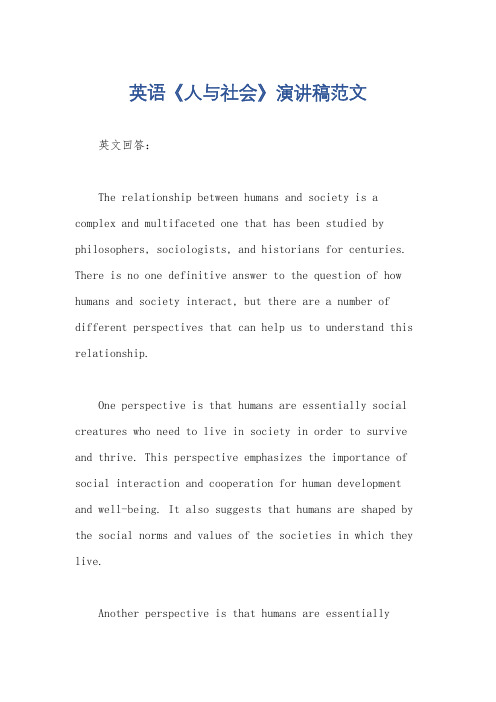
英语《人与社会》演讲稿范文英文回答:The relationship between humans and society is a complex and multifaceted one that has been studied by philosophers, sociologists, and historians for centuries. There is no one definitive answer to the question of how humans and society interact, but there are a number of different perspectives that can help us to understand this relationship.One perspective is that humans are essentially social creatures who need to live in society in order to survive and thrive. This perspective emphasizes the importance of social interaction and cooperation for human development and well-being. It also suggests that humans are shaped by the social norms and values of the societies in which they live.Another perspective is that humans are essentiallyindividualistic creatures who are capable of making their own choices and decisions. This perspective emphasizes the importance of individual agency and freedom. It also suggests that humans can be critical of the social norms and values of the societies in which they live and can work to change them.These two perspectives are not necessarily mutually exclusive. It is possible for humans to be both social and individualistic creatures. The relationship between humans and society is a dynamic one that is constantly evolving. As societies change, so too does the relationship between humans and society.In recent years, there has been a growing interest in the role of technology in the relationship between humans and society. Some argue that technology is making us more social and connected, while others argue that it is making us more isolated and individualistic. It is likely that the truth lies somewhere in between. Technology is a powerful tool that can be used for both good and evil. It is up to us to decide how we use technology and how we want to shapethe relationship between humans and society.中文回答:人与社会的关系错综复杂,几个世纪以来一直是哲学家、社会学家和历史学家研究的课题。
人文主题英语演讲稿范文
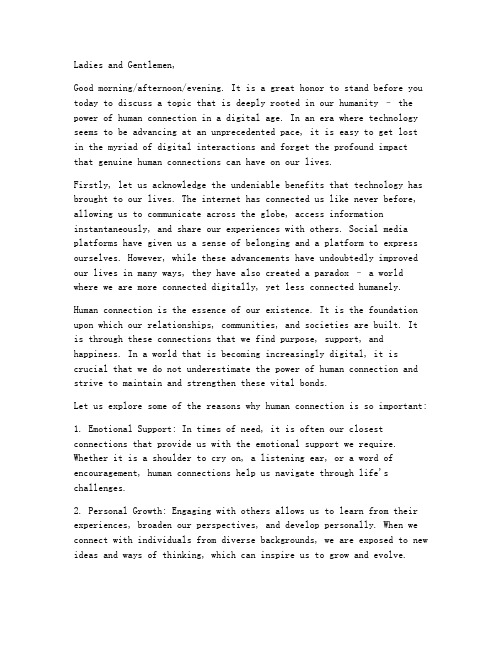
Ladies and Gentlemen,Good morning/afternoon/evening. It is a great honor to stand before you today to discuss a topic that is deeply rooted in our humanity – the power of human connection in a digital age. In an era where technology seems to be advancing at an unprecedented pace, it is easy to get lost in the myriad of digital interactions and forget the profound impactthat genuine human connections can have on our lives.Firstly, let us acknowledge the undeniable benefits that technology has brought to our lives. The internet has connected us like never before, allowing us to communicate across the globe, access information instantaneously, and share our experiences with others. Social media platforms have given us a sense of belonging and a platform to express ourselves. However, while these advancements have undoubtedly improved our lives in many ways, they have also created a paradox – a world where we are more connected digitally, yet less connected humanely.Human connection is the essence of our existence. It is the foundation upon which our relationships, communities, and societies are built. It is through these connections that we find purpose, support, and happiness. In a world that is becoming increasingly digital, it is crucial that we do not underestimate the power of human connection and strive to maintain and strengthen these vital bonds.Let us explore some of the reasons why human connection is so important:1. Emotional Support: In times of need, it is often our closest connections that provide us with the emotional support we require. Whether it is a shoulder to cry on, a listening ear, or a word of encouragement, human connections help us navigate through life's challenges.2. Personal Growth: Engaging with others allows us to learn from their experiences, broaden our perspectives, and develop personally. When we connect with individuals from diverse backgrounds, we are exposed to new ideas and ways of thinking, which can inspire us to grow and evolve.3. Trust and Reliability: In a world where trust is often compromised, human connections foster a sense of reliability and loyalty. When we have meaningful relationships, we are more likely to rely on one another and collaborate towards common goals.4. Happiness and Well-being: Studies have shown that social connections are vital for our mental and emotional well-being. Positiverelationships contribute to our happiness, reduce stress, and increase life satisfaction.So, how can we cultivate and maintain these precious human connectionsin a digital age? Here are a few suggestions:1. Prioritize Face-to-Face Interactions: While digital communication is convenient, nothing can replace the warmth and depth of face-to-face interactions. Make an effort to spend quality time with loved ones, friends, and colleagues.2. Practice Active Listening: In today's fast-paced world, we often find ourselves multitasking and not truly listening to others. Take the time to engage in meaningful conversations, show genuine interest, and offer empathy.3. Build Strong Relationships: Invest in building and nurturing your relationships. Take the initiative to reach out, offer help, and be present in the lives of those around you.4. Unplug from Technology: Make it a point to disconnect from digital devices regularly. Allocate time for activities that do not involve screens, such as reading, exercising, or simply enjoying nature.5. Embrace the Power of Storytelling: Share your experiences, insights, and emotions with others. Storytelling is a powerful tool that can create a sense of unity and connection among people.In conclusion, the power of human connection in a digital age cannot be overstated. As we continue to embrace technological advancements, let us not forget the importance of nurturing our relationships and maintainingmeaningful connections. By doing so, we can create a more compassionate, understanding, and supportive world for all.Thank you for your attention, and I hope that today's speech hasinspired you to reflect on the value of human connection in your own life. Together, let us strive to bridge the gap between our digital and human worlds, and cultivate a future where genuine connections thrive.Thank you.。
人类命运共同体:共建和谐稳定的世界英文演讲稿范文
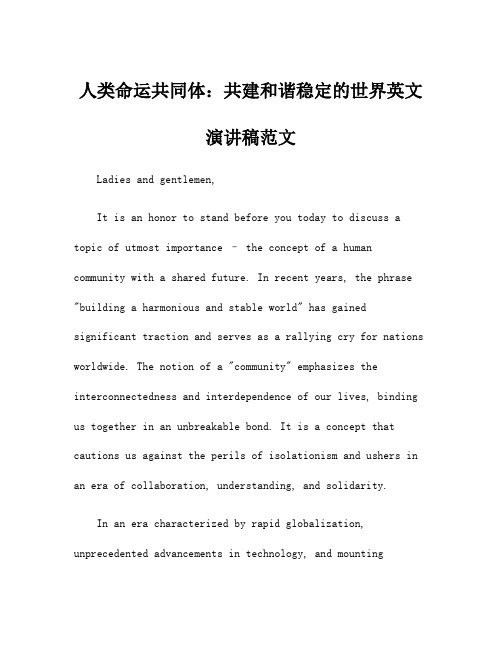
人类命运共同体:共建和谐稳定的世界英文演讲稿范文Ladies and gentlemen,It is an honor to stand before you today to discuss a topic of utmost importance – the concept of a human community with a shared future. In recent years, the phrase "building a harmonious and stable world" has gained significant traction and serves as a rallying cry for nations worldwide. The notion of a "community" emphasizes the interconnectedness and interdependence of our lives, binding us together in an unbreakable bond. It is a concept that cautions us against the perils of isolationism and ushers in an era of collaboration, understanding, and solidarity.In an era characterized by rapid globalization, unprecedented advancements in technology, and mountingchallenges such as climate change, poverty, and conflicts, the concept of a human community with a shared future has become not just a choice but a necessity. The destiny of humankind has become inextricably intertwined, and the path forward lies in recognizing our shared aspirations and challenges. As the world becomes increasingly interconnected, we must embrace the spirit of cooperation, collective action, and empathy to address these shared predicaments.Building a harmonious and stable world necessitates fostering mutual respect amongst nations, promoting dialogue, and seeking peaceful resolutions to conflicts. It means transcending political, cultural, and ideological differences to build a common ground based on universal values such as justice, equality, and human dignity. By recognizing that our destinies are intertwined, we can forge partnerships and alliances, bridging gaps, and strengthening understanding amongst peoples.Moreover, the concept of a human community with a shared future requires us to prioritize sustainable development and the wellbeing of all individuals, irrespective of nationality, race, or gender. Through promoting inclusive growth, tackling poverty, and ensuring access to quality education and healthcare for all, we can create conditions conducive tolong-term peace and stability. By protecting the environment, conserving resources, and combating climate change, we can secure a prosperous and sustainable future for generations to come.Realizing the vision of a human community with a shared future necessitates the active participation andcollaboration of all stakeholders – individuals, governments, civil society organizations, and the private sector. Together, we must build bridges, break down barriers, and fostergenuine partnerships, allowing ideas and innovations to flow freely. It is only through collective effort and a commitmentto common goals that we can overcome existing challenges and forge a more prosperous future for all.As we seek to build a harmonious and stable world, we must constantly remind ourselves that our destinies are inextricably intertwined. The challenges we face today are not contained within borders; they transcend geography and nationality. It is only by recognizing the importance of a human community with a shared future that we can overcome these challenges, leaving behind a legacy of peace, progress, and prosperity for generations to come.In conclusion, let us remember that the concept of a human community with a shared future is not just an abstract idea; it is a call to action. It compels us to transcend our differences, prioritize sustainable development, and foster collaboration amongst nations. It is a vision that emphasizes our collective responsibility to build a harmonious and stable world. By embracing the spirit of cooperation, mutualrespect, and empathy, we can pave the way for a brighter future for all of humanity. Thank you.。
关于humanity的英文作文
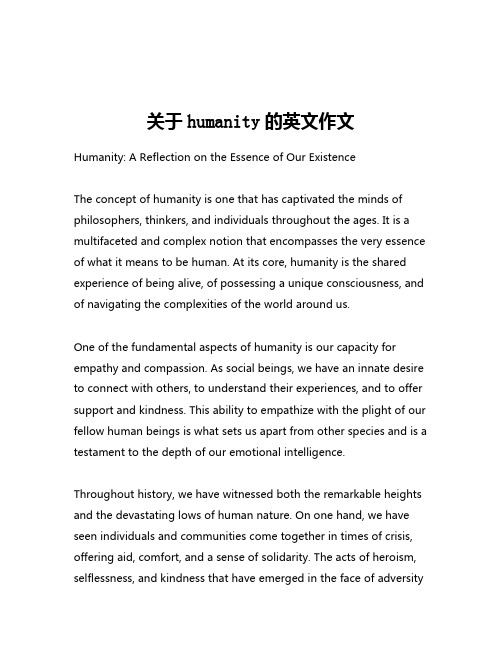
关于humanity的英文作文Humanity: A Reflection on the Essence of Our ExistenceThe concept of humanity is one that has captivated the minds of philosophers, thinkers, and individuals throughout the ages. It is a multifaceted and complex notion that encompasses the very essence of what it means to be human. At its core, humanity is the shared experience of being alive, of possessing a unique consciousness, and of navigating the complexities of the world around us.One of the fundamental aspects of humanity is our capacity for empathy and compassion. As social beings, we have an innate desire to connect with others, to understand their experiences, and to offer support and kindness. This ability to empathize with the plight of our fellow human beings is what sets us apart from other species and is a testament to the depth of our emotional intelligence.Throughout history, we have witnessed both the remarkable heights and the devastating lows of human nature. On one hand, we have seen individuals and communities come together in times of crisis, offering aid, comfort, and a sense of solidarity. The acts of heroism, selflessness, and kindness that have emerged in the face of adversityare a testament to the resilience and compassion that lies at the heart of humanity.On the other hand, we have also witnessed the darker aspects of human nature, such as greed, cruelty, and the willingness to inflict harm upon others. Wars, genocides, and other atrocities have left indelible scars on the collective consciousness of humanity, reminding us of the capacity for destruction and the need for vigilance in safeguarding our shared values.Despite these challenges, however, the enduring spirit of humanity shines through. Time and time again, we have seen individuals and communities rise up to confront injustice, to champion the rights of the marginalized, and to work towards a more equitable and inclusive world. The civil rights movements, the fight for gender equality, and the global efforts to address climate change are all examples of the transformative power of human agency and collective action.At the heart of this ongoing struggle for a better world is the fundamental belief in the inherent worth and dignity of every human being. This principle of universal human rights, enshrined in international laws and declarations, is a testament to the shared aspiration of humanity to create a world where all people can live with dignity, freedom, and opportunity.Yet, even as we celebrate the triumphs of humanity, we must also acknowledge the challenges and complexities that continue to shape our collective experience. The vast disparities in wealth, access to healthcare and education, and the persistent patterns of discrimination and oppression that plague our societies are stark reminders of the work that still needs to be done.In the face of these challenges, the path forward for humanity lies in our ability to cultivate a deeper understanding and appreciation of our shared humanity. By fostering empathy, compassion, and a genuine respect for the inherent worth of all people, we can work towards a more just, equitable, and inclusive world.This process of building a more humane world requires a multifaceted approach, one that encompasses education, policy reform, and a fundamental shift in our collective mindset. It means challenging the systemic inequalities that perpetuate marginalization and exclusion, and it means embracing the diversity of human experience as a source of strength and resilience.Ultimately, the essence of humanity lies in our capacity to transcend our individual differences, to recognize our common bonds, and to work towards a future where all people can thrive and reach their full potential. It is a lofty and ambitious goal, to be sure, but one that isessential to the continued evolution and progress of our species.As we navigate the complexities of the modern world, let us hold fast to the core values of humanity – empathy, compassion, and a deep respect for the inherent worth of all people. Let us be the agents of positive change, the champions of justice, and the builders of a more equitable and inclusive world. For in doing so, we honor the very essence of what it means to be human, and we ensure that the light of humanity continues to shine brightly, guiding us towards a better future for all.。
以humanity为主题的英语作文
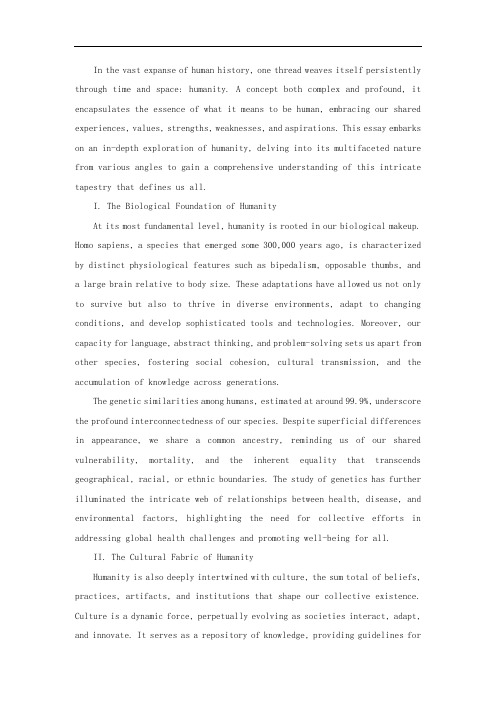
In the vast expanse of human history, one thread weaves itself persistently through time and space: humanity. A concept both complex and profound, it encapsulates the essence of what it means to be human, embracing our shared experiences, values, strengths, weaknesses, and aspirations. This essay embarks on an in-depth exploration of humanity, delving into its multifaceted nature from various angles to gain a comprehensive understanding of this intricate tapestry that defines us all.I. The Biological Foundation of HumanityAt its most fundamental level, humanity is rooted in our biological makeup. Homo sapiens, a species that emerged some 300,000 years ago, is characterized by distinct physiological features such as bipedalism, opposable thumbs, and a large brain relative to body size. These adaptations have allowed us not only to survive but also to thrive in diverse environments, adapt to changing conditions, and develop sophisticated tools and technologies. Moreover, our capacity for language, abstract thinking, and problem-solving sets us apart from other species, fostering social cohesion, cultural transmission, and the accumulation of knowledge across generations.The genetic similarities among humans, estimated at around 99.9%, underscore the profound interconnectedness of our species. Despite superficial differences in appearance, we share a common ancestry, reminding us of our shared vulnerability, mortality, and the inherent equality that transcends geographical, racial, or ethnic boundaries. The study of genetics has further illuminated the intricate web of relationships between health, disease, and environmental factors, highlighting the need for collective efforts in addressing global health challenges and promoting well-being for all.II. The Cultural Fabric of HumanityHumanity is also deeply intertwined with culture, the sum total of beliefs, practices, artifacts, and institutions that shape our collective existence. Culture is a dynamic force, perpetually evolving as societies interact, adapt,behavior, values, and worldviews. From art and literature to science and philosophy, the cultural achievements of humanity reflect our relentless pursuit of understanding, expression, and progress.Cultural diversity is a hallmark of humanity, with thousands of distinct cultures existing worldwide, each offering unique perspectives, wisdom, and creativity. This diversity enriches our collective human experience, fosters cross-cultural understanding, and promotes innovation through the exchange of ideas and practices. However, it can also give rise to conflicts when differences are perceived as threats rather than opportunities for growth. Thus, cultivating respect for cultural diversity, promoting dialogue, and fostering a sense of shared humanity are crucial for building harmonious, inclusive societies.III. The Ethical Imperative of HumanityCentral to our understanding of humanity is the ethical dimension – the principles that guide our interactions with one another and the world around us. Human rights, justice, compassion, and empathy form the bedrock of ethical conduct, reflecting our recognition of the inherent dignity and worth of every individual. These values underpin the development of laws, institutions, and social norms designed to protect the vulnerable, promote fairness, and foster mutual respect.However, history is replete with instances where these principles have been violated, from slavery and genocide to discrimination and inequality. Such transgressions serve as stark reminders of the ongoing struggle to actualize our ethical ideals and the imperative to continually examine and challenge systems that perpetuate injustice. The quest for a more humane world necessitates a commitment to introspection, education, and collective action, driven by the belief that every individual has a responsibility to contribute to the betterment of society.IV. The Technological Impact on HumanityTechnology, particularly in recent decades, has reshaped virtually everyperceive ourselves. While technological advancements have brought immense benefits, enhancing efficiency, connectivity, and access to information, they have also raised profound ethical, social, and environmental questions. Issues such as privacy invasion, digital divide, job displacement, and the exacerbation of social isolation warrant careful consideration and proactive mitigation strategies.Moreover, the rapid pace of technological change confronts humanity with existential challenges, such as the potential misuse of artificial intelligence, the threat of autonomous weapons, and the looming climate crisis. Addressing these concerns requires a holistic approach that integrates technological innovation with ethical deliberation, social responsibility, and long-term sustainability considerations. Ultimately, technology should serve humanity, augmenting our capabilities while preserving our core values and ensuring a livable future for generations to come.V. The Future Trajectory of HumanityLooking ahead, the trajectory of humanity will be shaped by the choices we make today. The ongoing globalization, demographic shifts, and accelerating technological advancements present both opportunities and challenges. To navigate this uncertain landscape, we must cultivate a global consciousness that recognizes our shared destiny and interdependence, fostering cooperation and solidarity in addressing global issues such as climate change, poverty, inequality, and conflict.Education, particularly in the areas of critical thinking, emotional intelligence, and global citizenship, will be pivotal in equipping future generations with the skills and values needed to navigate an increasingly complex and interconnected world. Furthermore, fostering a culture of lifelong learning and adaptability will enable individuals to keep pace with the rapid changes brought about by technological advancements and societal transformations.In conclusion, humanity is a rich, multifaceted tapestry woven from the threads of biology, culture, ethics, technology, and an ever-evolving future.Each strand contributes to our collective identity, shaping our experiences, aspirations, and the world we inhabit. As we continue to unravel the complexities of humanity, it becomes increasingly clear that our shared journey is one of continuous learning, adaptation, and striving towards a more equitable, compassionate, and sustainable world. By embracing our interconnectedness, celebrating our diversity, upholding ethical principles, harnessing technology responsibly, and envisioning a shared future, we can forge a path that honors the essence of humanity and ensures the continued flourishing of our species.。
- 1、下载文档前请自行甄别文档内容的完整性,平台不提供额外的编辑、内容补充、找答案等附加服务。
- 2、"仅部分预览"的文档,不可在线预览部分如存在完整性等问题,可反馈申请退款(可完整预览的文档不适用该条件!)。
- 3、如文档侵犯您的权益,请联系客服反馈,我们会尽快为您处理(人工客服工作时间:9:00-18:30)。
Humanity
Have you ever noticed that every time you look around, what you receive is not a smile of kindness, but a glance of indifference, or in most cases, you can just find people doing their own business, like playing with the smartphone, and not paying any attention to you? Electronic devices can help us get easy access to whatever is happening all over the world. They shorten the distance between the individuals and the world, but they are separating people apart.
There’s a heated discussion on t he internet recent years: should you help the old when he or she falls down on the street? I believe everyone has come across this question. It’s really a misery that such a topic can arouse the attention of the whole society. But at the same time, I have to admit that the answer won’t be clear for me until I am actually confronted with this situation. And when thinking about it, I care more about my own interest. I offer my seat to the old and I’m willing to help when other people turn to me. Aren’t I supp osed to say yes when confronted with such question? Then I realize that I help others more out of custom or manners, not humanity.
Talking of humanity, a movie named Saving Private Ryan comes to my mind. Before I watched this film, I’ve heard about this mo vie for a long time. And I think most of us have either heard about or watched it. Have you ever had a question that is it worth saving one life while sacrificing eight people? Let’s put this question aside and talk about another film Schindler's List. Schindler used to be a typical German capitalist who cared nothing but making money. His accountant and what the Germans had done to Jews changed him into a real human being. He saved more than one thousand Jews with all his money. What has shocked me is that at the end of the movie, Schindler kept saying ’I could have saved more.’ He felt guilty for spending too much money for pleasure, which could buy more people’s lives. One thousand lives seem to be a remarkable honor to me, but it’s not enough to Schindle r. Then I realize that every single life means everything to the one who owns it. It can’t be measured by anything. It’s never about whether it’s worthy or not.
There is no way for us to be human without other people. Everyone in this world is connected to some degree. What the world lacks now is not only good manners, but more importantly, the care for human beings. A little kindness from a stranger can sometimes mean a lot to the receiver.
I would embrace the world with kindness and help others as long as I can from my heart. Believe it or not, it will make a difference.。
